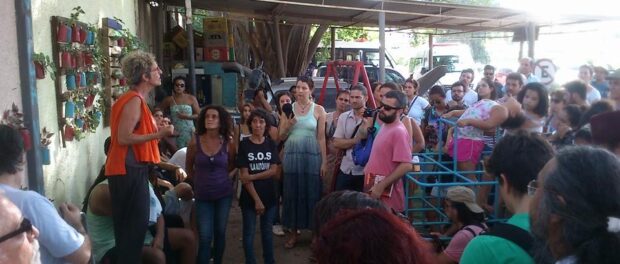
“Not all authors, not all professors or researchers have the privilege to launch their book exactly in the place and in the situation about which the book is talking.”
These were the opening lines renowned architect, urban planner, professor and researcher Dr. Raquel Rolnik gave during the launch of her new book War of Places: The Colonization of Land and Housing in the Financial Era in Vila Autódromo on Saturday, March 5. Approximately 100 people gathered in the community playground in Vila Autodromo to hear the former Special Rapporteur to the United Nations on Adequate Housing speak. Standing on top of a stone, Rolnik made an impassioned speech on the urgency of the situation at this tense moment for the community.
“Much of what I learned that is detailed in this book, I learned from Penha and from the residents and those who helped the residents of Vila Autodromo. They taught me and told me things during the six years that I was Special Rapporteur to the UN.”
The main argument of her speech, and her book, was that there is a global phenomenon land grab taking place with land being taken to serve as support to the financial markets and capital accumulation. “This is a global process. It is happening everywhere,” she said.
“We are talking about a process of occupation of space and construction of space that has nothing to do with people’s needs. It has nothing to do with what people need to live individually or collectively, the necessity of housing, the necessity of using public spaces or the necessity of using space for economic activities. It is exclusively about the opportunity to capture more places where financial capital can find ways to invest to generate more profit for itself.”
Rolnik stated that urban land is a perfect vehicle for this type of investment for two reasons. Firstly, land may decrease in value, but it will never cease to exist. This is very different from other more volatile methods of investment. The second reason is that land can be used as a guarantee for other investments, which makes it valuable to hold onto.
Brazil, Rolnik said, is different from other countries around the world in that it lacks a political climate that guarantees housing as a right. War of Places describes cases in various countries to show different political cultures around housing and how the poor are being disproportionately affected by the aftermath of the 2008 global financial crisis.
“The reality is that the poorest and most vulnerable people in the moment when a financial crisis happens are the ones that pay. They are the ones that have nothing, that end up in the middle of the street. States, cities, and countries where they live do not have any alternative policy for dealing with them,” said Rolnik.
Perhaps the most poignant statement Rolnik made during her lecture was the connection between the increased use of land and housing as a financial asset and the weakening of the rights of the poor. This is dealt with “in other terms: with evictions.”
The registration and formalization of land, she said, is not for the benefit of those who live on it, but rather to benefit those who are trying to use the land for speculative purposes because it only serves them when it is “on the books.”
According to this logic, using land as housing for the poor is seen to be the worst possible use because it does not maximize financial gains. With this logic, the most viable options are places for shopping malls or five-star hotels.
Rolnik summarized this view: “The only value is what the maximum profit can be from the land, including from public land.”
Rolnik finished her talk noting that Brazil has historically intentionally fostered real estate speculation with the government providing favors to large corporations even throughout the administrations of Lula and Dilma of the Workers Party.
However, she noted, there is hope for fighting these problems, especially through passing knowledge down to younger generations and continuing to resist. She said: “The future is already here. The future is here through the resistances. The future is here through this solidarity.”
For RioOnWatch‘s full book review of War of Places: The Colonization of Land and Housing in the Financial Era by Dr. Raquel Rolnik click here.


